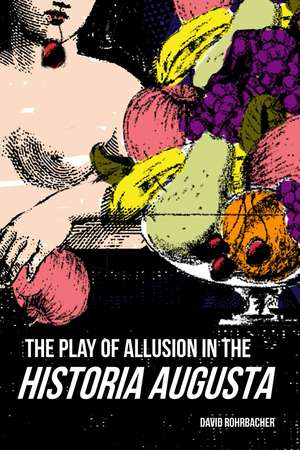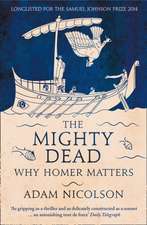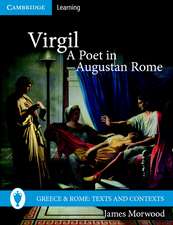The Play of Allusion in the Historia Augusta: Wisconsin Studies in Classics
Autor David Rohrbacheren Limba Engleză Hardback – 25 ian 2016
By turns outlandish, humorous, and scatological, the Historia Augusta is an eccentric compilation of biographies of the Roman emperors and usurpers of the second and third centuries. Historians of late antiquity have struggled to explain the fictional date and authorship of the work and its bizarre content (did the Emperor Carinus really swim in pools of floating apples and melons? did the usurper Proculus really deflower a hundred virgins in fifteen days?). David Rohrbacher offers, instead, a literary analysis of the work, focusing on its many playful allusions. Marshaling an array of interdisciplinary research and original analysis, he contends that the Historia Augusta originated in a circle of scholarly readers with an interest in biography, and that its allusions and parodies were meant as puzzles and jokes for a knowing and appreciative audience.
| Toate formatele și edițiile | Preț | Express |
|---|---|---|
| Paperback (1) | 177.37 lei 43-57 zile | |
| University of Wisconsin Press – 20 ian 2020 | 177.37 lei 43-57 zile | |
| Hardback (1) | 506.04 lei 43-57 zile | |
| University of Wisconsin Press – 25 ian 2016 | 506.04 lei 43-57 zile |
Din seria Wisconsin Studies in Classics
-
 Preț: 71.93 lei
Preț: 71.93 lei -
 Preț: 357.07 lei
Preț: 357.07 lei -
 Preț: 160.09 lei
Preț: 160.09 lei -
 Preț: 321.58 lei
Preț: 321.58 lei -
 Preț: 116.93 lei
Preț: 116.93 lei -
 Preț: 58.57 lei
Preț: 58.57 lei -
 Preț: 208.26 lei
Preț: 208.26 lei -
 Preț: 238.93 lei
Preț: 238.93 lei -
 Preț: 322.99 lei
Preț: 322.99 lei -
 Preț: 403.33 lei
Preț: 403.33 lei -
 Preț: 149.95 lei
Preț: 149.95 lei -
 Preț: 66.23 lei
Preț: 66.23 lei -
 Preț: 118.67 lei
Preț: 118.67 lei -
 Preț: 306.62 lei
Preț: 306.62 lei -
 Preț: 229.03 lei
Preț: 229.03 lei -
 Preț: 310.59 lei
Preț: 310.59 lei -
 Preț: 336.39 lei
Preț: 336.39 lei -
 Preț: 258.86 lei
Preț: 258.86 lei -
 Preț: 153.95 lei
Preț: 153.95 lei -
 Preț: 428.40 lei
Preț: 428.40 lei -
 Preț: 429.75 lei
Preț: 429.75 lei -
 Preț: 227.80 lei
Preț: 227.80 lei -
 Preț: 506.04 lei
Preț: 506.04 lei - 15%
 Preț: 478.79 lei
Preț: 478.79 lei -
 Preț: 247.73 lei
Preț: 247.73 lei -
 Preț: 402.76 lei
Preț: 402.76 lei - 15%
 Preț: 476.55 lei
Preț: 476.55 lei -
 Preț: 178.13 lei
Preț: 178.13 lei -
 Preț: 257.29 lei
Preț: 257.29 lei -
 Preț: 119.03 lei
Preț: 119.03 lei -
 Preț: 166.72 lei
Preț: 166.72 lei -
 Preț: 187.37 lei
Preț: 187.37 lei -
 Preț: 199.67 lei
Preț: 199.67 lei -
 Preț: 218.12 lei
Preț: 218.12 lei - 23%
 Preț: 608.98 lei
Preț: 608.98 lei - 23%
 Preț: 589.87 lei
Preț: 589.87 lei -
 Preț: 347.37 lei
Preț: 347.37 lei -
 Preț: 305.90 lei
Preț: 305.90 lei -
 Preț: 122.89 lei
Preț: 122.89 lei -
 Preț: 177.37 lei
Preț: 177.37 lei - 23%
 Preț: 591.20 lei
Preț: 591.20 lei -
 Preț: 160.48 lei
Preț: 160.48 lei -
 Preț: 258.14 lei
Preț: 258.14 lei -
 Preț: 258.25 lei
Preț: 258.25 lei - 23%
 Preț: 450.63 lei
Preț: 450.63 lei - 23%
 Preț: 709.57 lei
Preț: 709.57 lei -
 Preț: 502.03 lei
Preț: 502.03 lei -
 Preț: 245.06 lei
Preț: 245.06 lei
Preț: 506.04 lei
Nou
Puncte Express: 759
Preț estimativ în valută:
96.86€ • 105.25$ • 81.42£
96.86€ • 105.25$ • 81.42£
Carte tipărită la comandă
Livrare economică 21 aprilie-05 mai
Preluare comenzi: 021 569.72.76
Specificații
ISBN-13: 9780299306007
ISBN-10: 0299306003
Pagini: 272
Dimensiuni: 152 x 229 x 20 mm
Greutate: 0.5 kg
Ediția:1
Editura: University of Wisconsin Press
Colecția University of Wisconsin Press
Seria Wisconsin Studies in Classics
ISBN-10: 0299306003
Pagini: 272
Dimensiuni: 152 x 229 x 20 mm
Greutate: 0.5 kg
Ediția:1
Editura: University of Wisconsin Press
Colecția University of Wisconsin Press
Seria Wisconsin Studies in Classics
Recenzii
“This lively and original analysis of the Historia Augusta successfully argues that it was a fictional work to entertain a fifth-century audience, and the pleasure resides in the deliberate anachronisms, allusions, and parodies of both ancient and more contemporary authors and genres.”—Ellen O’Gorman, University of Bristol
“A valuable literary study that synthesizes a large, diffuse body of scholarship, integrating it in an intelligent argument about the literary milieu in which the Historia Augusta emerged. The Historia Augusta has long needed a study like this one.”—Adam Kemezis, University of Alberta
Notă biografică
David Rohrbacher is associate professor of classics at New College of Florida. He is the author of The Historians of Late Antiquity.
Cuprins
Preface
List of Abbreviations
Introduction
1 Allusion in the Historia Augusta
2 The Historia Augusta and the Ancient Reader
3 Religion in the Historia Augusta
4 Imperial History Reimagined
Afterword
Notes
Bibliography
Index
Index Locorum
List of Abbreviations
Introduction
1 Allusion in the Historia Augusta
2 The Historia Augusta and the Ancient Reader
3 Religion in the Historia Augusta
4 Imperial History Reimagined
Afterword
Notes
Bibliography
Index
Index Locorum
Descriere
By turns outlandish, humorous, and scatological, the Historia Augusta is an eccentric compilation of biographies of the Roman emperors and usurpers of the second and third centuries. By analyzing it as literature rather than as history, David Rohrbacher offers a new and compelling explanation for this strange text that has long vexed scholars.














